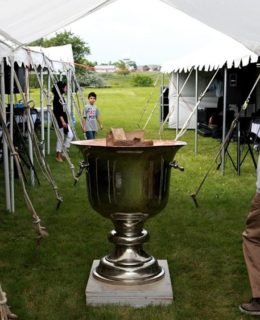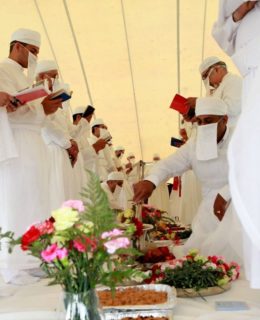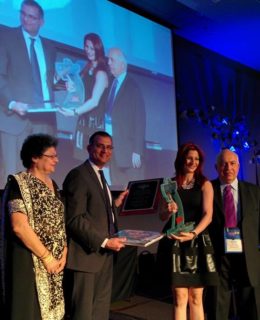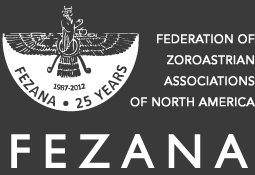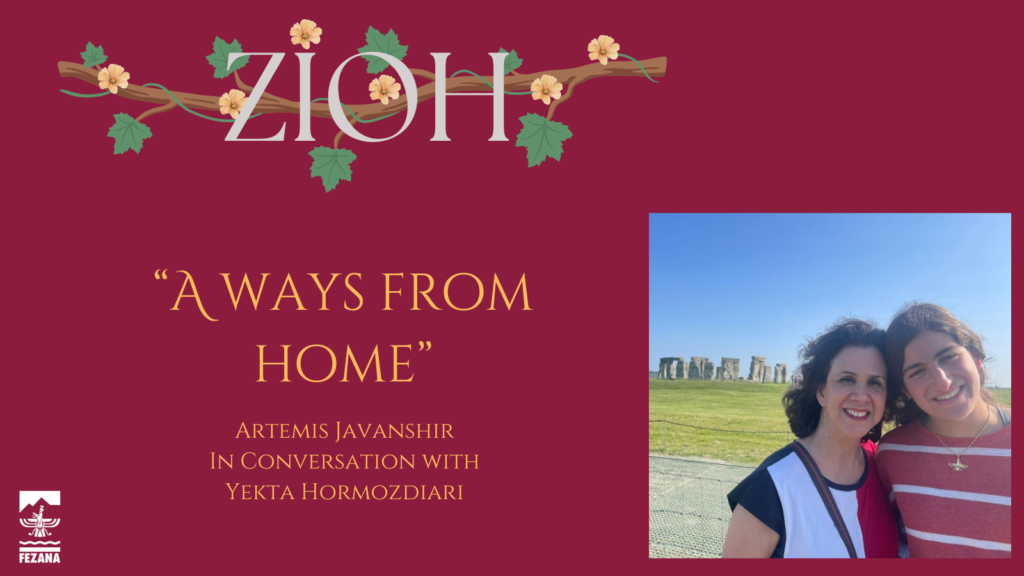
Youth: Yekta Hormozdiari
An individual’s past shapes the way they view the present and approach the future. Sitting down and looking at one’s journey in a conversation revealed to me both how my mother’s past had impacted her but also the way which it trickled down to impact me as well.
Participant: Artemis Javanshir
I trust that by sharing my thoughts and experiences with Yekta, it has offered her a fresh perspective on our homeland, family, and beliefs, empowering and enlightening her for the journey ahead. These narratives not only foster deeper connections between individuals but also serve as an invaluable oral heritage for generations to come to reflect upon.
A WAYS FROM HOME: An Interview with Artemis Javanshir
Interviewer: Yekta Hormozdiari
Date: 2/1/2024
Transcript
00:00:00 Interviewer
Hello, I’m Yekta Hormozdiari, the daughter of Keykhosrow Hormozdiari and Artemis Javanshir. Today I’ll be interviewing Artemis Javanshir. The first question I’ll be asking is what did being Zoroastrian mean to you as a child? How about now?
00:00:17 – 00:02:10 Interviewee
Well hello Yekta. As a child, I did not live within a Zoroastrian community. My father and mother worked very hard and cultivated a large section of land in the northern part of Iran by the Caspian Sea. They built the area into a small town, and a beachside resort called Motel Ghoo where middle class families could afford to vacation and enjoy their summer days. Most of my childhood life was spent in motel Ghoo and some in Tehran, but in both cases away from the larger Zoroastrian community.
As a child in Iran, I remember two things about being a Zoroastrian, one from an ethical point of view and the other from a ritual point of view. Ethically, lying was the worst thing we could do in my household. My mom would always say that a Zoroastrian never lies. From a ritual point of view, I remember when we were supposed to take a bath, my nanny, Fatemeh, would fill the top with water and wash me. I was a little then. At the end, when it was time to pour water over my head and get all the suds out, my mom would come in and pour the water, singing Ashem Vohu until I was all rinsed out. That was how I learned the Ashem Vohu prayer. I did not learn its meaning until I was a young adult. Today, being a Zoroastrian to me is to do my best every day, follow Asha, be productive, and educate myself.
00:02:10 – 00:02:20 Interviewer
In what way was your Zoroastrian identity impacted by your migration and childhood both in Iran and in America?
00:02:20 – 00:07:24 Interviewee
Well, in Iran and before the Islamic Revolution, I really didn’t feel as if I was a minority or being a Zoroastrian made me any different from the next person. I will share two memories, one from my mom and one of my own to hopefully demonstrate the few times that I did feel different. Close to the beachy sand in Motel Ghoo, my father had built a large circular above the ground fire pit where a fire would be lit every night. My mom once told me that she heard one of the travelers say that Mister Javanshir lights this fire every night for his wife, who is a Zoroastrian. This memory of my mom’s was one of the times I had the impression that my family or I may be different from others.
I can share a more personal memory. I used to ride the bus to a nearby city called Chalous to attend early elementary school, and I remember one of the children on the bus called me a fire worshiper. I came home crying to my mom. The phrase worship in Persian is “Parastesh” which my mom told me comes from the word “Parastar” the fire. Parastar is someone who takes care of something. So she told me ofcourse we worship “Parasteh,” the fire. We take care of it. What is wrong with that? I remember that made me feel good and it made a lot of sense. It made me proud to be a Zoroastrian because we took care of a natural element, fire.
Of course, the environment that we grow up in affects us. My nanny lived with us during the week. She was a Muslim and prayed a few times a day. As a child, I learned the Muslim’s daily prayer from her and used to mimic her and recite them sometimes. I never identified as a Muslim, nor even thought about my action. Now that I look back, it is very interesting that my mom never objected. If I was her, I don’t know if I could be as accepting as she was.
And my exposure to the Zoroastrian community really started after immigrating to Los Angeles in 1980. I was about 12 years old then. It was very hard to leave Iran, and I was unhappy for a long time. During the revolution, the universities closed in Iran, many Iranian youth migrated to the US to pursue their studies. Therefore, there was a small Zoroastrian youth community in Los Angeles. I remember my mom encouraged my older sisters to attend their events, and one of my sisters decided to attend an event and after that both my older sisters were hooked. They loved the Zoroastrian friends they found. My mom was very strict and she would rarely let me go out with my school friends, but she was very easy to say yes to going out with Zoroastrian youth. So we used to go camping, biking and out to dinners together. I’m still in contact with them; We have our own families and children, some have grandchildren. They are my community and I feel I can count on them.
Going back to those early years in Los Angeles, my mom used to host the youth at our house once a week. Ravanshaad Dr. Ali Akbar Jafarey would make the drive from Orange County area to our home which was about an hour away from his residence. He would talk to us about the teachings of Zarathustra, and this is where I received my first exposure to the Gathas and a meaningful exposure to Zoroastrianism. I attended his classes at UCLA, then Santa Monica, and followed him to the valley area. When it was time for me to choose the Zoroastrian religion, I did so with free will and enough understanding. So I guess to sum up your question about my Zoroastrian identity before and after migration, I have to say that before migration I identified myself as a Zoroastrian, but all I knew about the religion was that lying is unacceptable. After migration, I chose to be a Zoroastrian with the basic understanding of Zarathishtra’s teaching.
00:07:34 – 00:07:40 Interviewer
You spoke of your migration. What was the process of immigration for you and your family?
00:07:40 – 00:08:26 Interviewee
Parimarz Firoozgar, my mom, was among the first class of women to graduate law school in Iran. To pursue further studies, she came to Los Angeles and attended UCLA. This was during the Pahlavi era and a few decades before the 1979 revolution in Iran. She loved the United States, and wanted us to live in the U.S. so she thought ahead and I was born in the United States. I’m lucky because I did not experience many of the hardships that other immigrants experienced in getting residency. At the start of the revolution, when the universities closed in Iran, my older sister came to the U.S. to attend UCLA. Then my mom and other siblings migrated. I arrived last. Then my father joined us.
00:08:44 – 00:08:51 Interviewer
Can you describe what the social and political conditions were like in your home country when you decided to?
00:08:51 – 00:12:32 Interviewee
My father, Jamshid Javanshir, was a visionary, a hard worker and a very generous man. As I said earlier, the environment, political times and the conditions we live in affect our behavior. Many of the same workers whom my father built homes for, created jobs for and generously gave to turned against him. I remember close to 1979 there was a fire at one of the worker’s homes that spread to the other home. Unfortunately, a child was burned in one of the homes. One of the workers took the burned body of the child and threw it on my father’s desk, accusing him of the incident. The times leading to the 1979 revolution were hard times. It was as if people had gone crazy. They blamed those with better economic status for all their problems. Motel Ghoo was a family beach resort. So during the Pahlavi era, families would wear bathing suits at the beach and popular singers of the time would come to Motel Ghoo to sing and entertain the families. This was not acceptable Islamic behavior. Even though the activities occurred before the revolution, my father was accused of acting against Islamic principles and was thrown in jail. Unfortunately, or fortunately, actually due to all his good deeds, there were no complaints against him and he was released after a while. He had spent his fortune and put his life and soul into Motel Ghoo. It was his baby and he had great dreams to improve it. His next plan was to build a university there, but after the revolution, all his belongings, including Motel Ghoo, were confiscated and taken away from him. Since my mom was married to my dad, her fortune, including her inheritance, was was also confiscated.
I was in the 7th grade at the time and I remember there were so many political fractions among my peers. Some of my childhood friends had joined the “Mojahedin” group and had started wearing head covers. Another friend of mine had joined the “Mossadegh” School of thought. Revolutionary songs were very popular and kids would recite them. Instead of attending classes, students would sit in the schoolyard in protest. I did not part take part in these. I remember my mum’s words at the beginning of the revolution that, and she said that state matters and religion have to be separate. Anyone who wants to mix the two will bring disaster.
At night, there was frequent sounds of bombs coming off and streets were not safe. People were in a revolutionary phase. Some nights we slept on the floor to avoid getting hit by any bullets that may happen to fly through the window. My family basically migrated to Los Angeles because it was not safe for us in Iran.
00:12:39 – 00:12:52 Interviewer
Were there any important or interesting historical events happening around the world at the time? Did they have any bearing on your decision to move? And why did you and your family choose to migrate?
00:12:52 – 00:13:29 Interviewee
Well, as a child I was not aware of any historical events happening around the world at the same time. But with the universities and schools closing Iran, our families, wealth confiscated and revolutionary mode of uncertainty specially for those who were more well off during the Pahlavi regime were all the reasons my family migrated to Los Angeles to basically pursue education and because it was not safe in Iran.
00:13:29 – 00:13:41 Interviewer
Can you describe some of your earliest memories of moving to the US? Why do you think these are so powerful? Did you experience any kind of cultural shock?
00:13:41 – 00:17:01 Interviewee
Yes, I can still clearly remember an early memory. I had recently arrived in Los Angeles and we were riding in our car on Santa Monica Blvd. Passing the 405 freeway entrance near Sepulveda when I saw a man. Out of his car, one hand on the steering wheel and the other hand on the body of his car, pushing his car to the side or to the gas station. And we just drove by. This would have never happened in Iran. The minute someone was in need, 10 people would be helping the man push the car. I was simply baffled. I asked my mom why aren’t we stopping to help? And she said we can’t do that in the US. I asked her why and she said, our intentions may be good, but if something happens, the man can sue us and we lose everything.
I’ll share another cultural shock I experienced. In Iran, our classmates would become our pack and we’d watch out for one another. I soon learned that it was different here. This was different. Here my classmates would be my good friends when we had class together, but after the class term was over, so was the friendship. Sometimes they didn’t even say hi when they saw me in the hall.
And I want to tell you a funny story. It’s a different story in Iranian culture. We have something called “tarof”. It’s when you offer something to someone to be nice, but that person would not necessarily accept your offer or it would be rude. I was in high school and was about to eat my sandwich for lunch when I saw an American sitting next to me looking at me. So being a well brought up Iranian girl, I offered him my sandwich and he took it. He ate it all in front of me. I learned not to practice “tarof” with non-Iranians from then on.
I had good experiences too. For the first year and a half, I was placed in an English as a second language class. My teacher, Mrs. Hildreth Simmons, was amazing. She became someone who I loved. She taught us not only the English language, but the American music and culture. She used to take us bowling and encouraged me to take part in the speech competition, which surprisingly won me the third prize. It was also at the time when the hostages were taken in Iran and it was a very difficult time in school for Iranians and stress level was high for both Iranians and Americans, and sometimes kids would fight after school over the incident.
But going back to your question, I think these memories are powerful because they are in opposition to the culture I grew up in and they are unexpected experiences.
00:17:14 – 00:17:21 Interviewer
How easy or hard was it to integrate into the culture of The United States?
00:17:21 – 00:18:52 Interviewee
It was very hard for me to integrate into the US culture. I don’t think I have successfully integrated even today. Upon arriving in Los Angeles, I just wanted to go back to Iran. In my mind, coming to US was a temporary condition. My father had gained my agreement in coming to U.S. with the condition that I could return to Iran anytime I wanted to, and I wanted to go back. I left all my dear objects in Iran, making sure I would go back. I used to come home from school and lock myself in the bathroom and cry. My mom thought I was getting mixed up with boys or drugs. Some of the migrating Iranians choose to only hang out with Americans to improve their language skills and integration into the new culture. My love of Iran and the Persian language, along with the constant hope of going back to Iran, made this unthinkable.
I think the first time I felt like U.S. was also my home was when I saw the 9/11 attack on the television. I had just woken up to go to work when I saw it, it was, I was very angry and upset. I think that was the first time that I admitted to myself that the U.S. was also home.
00:18:52 – 00:18:59 Interviewer
Do you still maintain ties with people back from Iran? How do you stay connected? Why is it important to you?
00:18:59 – 00:19:14 Interviewee
The only person that I communicate with in Iran is my niece. Uh, we use WhatsApp to communicate with one another. I like my niece. She is lovely and always brings with her good memories of my father.
00:19:14 – 00:19:18 Interviewer
What is the Zoroastrian culture according to you?
00:19:18 – 00:20:33 Interviewee
Zoroastrian culture, to me, has many layers. It stems, of course, from the core, which is the Gathas, a guide to better living. The other layers are what developed after and existed before Zarathustra, and although at times deviated from the teachings, but in general carry the underlying principles and the culture to lead the world toward betterment.
The main concept is Asha or truth and doing what is right. To plant trees, have gardens and not to pollute nature. To live in harmony with other animals and not to kill them just for sport. It is a culture of helping others and being tolerant of other people’s beliefs and way of life. It is to stand up against tyranny. It has very close ties with Iranian history, identity and ancient culture, which still resonates in many Iranians, whether they realize it or not. This combination makes this western religion the strong part of my identity.
20:20: – 00:20:49 Interviewer
Do you consider your identity as a Zoroastrian different or similar to that of the members of your family? What about members of previous generations?
00:20:49 – 00:22:32 Interviewee
Wow, you asked great questions. To answer your question about the Zoroastrian identity in the previous generation, I want to share with you a memory that my mother shared with me about her father. My grandfather, Goshtasb Firoozgar would wake up every morning before sunrise to renew his kusti before starting the day. Each of his children took turns getting up and getting the fire ready for him. I never met my grandfather, so I do not know of his beliefs, but just because of this act and all his charity, including building the hospital in Tehran, tells me that he not only believed in the philosophy, but he practiced it as well.
I think my children identify as Zoroastrian because we are a Zoroastrian household, just like my mom identified as a Zoroastrian, and that got passed on to me. I like to believe that now that my girls are older, they identify as Zoroastrian not because of family identity, but because of the rest of Zarathustra’s teachings. You are my daughter, Yekta. I think you can answer this question from your point of view. Is your identity as a Zoroastrian different or similar to the other members of the family?
00:22:32 Interviewer
I think my beliefs follow their own unique perspective because they’ve been shaped by my attendance of Catholic school as well as my involvement in other religious organizations. I think they share similarities definitely to a lot of members of my family as our points of ethics and our principles and what we value is shaped largely by family and less so by exterior factors. So I think just on that, it’s safe to say that my views and my beliefs share more similarities than I realize, but I also think there are points where my views differ from those in our families. For example, I definitely have a different view of faith than my father because I’ve been placed in a situation where I wasn’t necessarily forced to follow a religion, but I got to choose a religion to learn from, not necessarily follow in a school perspective. So while my parents were forced to learn about Islam growing up in Iran, I had the choice whether or not to attend public school or Catholic school, and I chose Catholic school. That does not mean I’m Catholic, but it just means I had the ability to learn from and be shaped by other religions in a way that other people may not be as open to. So I think that has affected the way that I view religion and the way that it affects other people, and therefore it’s also changed the way that I as a person practice faith.
00:24:09 – 00:24:43 Interviewee
Hmm. I have to say I have watched you in interfaith gatherings where you explain about the Zoroastrian religion and your beliefs, and every time I’m amazed of your understanding of the core principles of the Zoroastrian religion, and every time I listen to you, I’m proud of the person you have become. I love you.
00:24:43 – 00:24:53 Interviewer
Last question, do you think if you stayed in Iran, you or your kids would have learned more about the Zoroastrian religion than what they have an understanding of?
00:24:53 – 00:25:27 Interviewee
Now that is a very hard question to answer. If we are talking about staying in today’s Iran, I would say yes. The Islamic Revolution of Iran has driven many Iranians to their ancient roots. I think I and my children would be among those who would eagerly want to learn about our ancient past Zoroastrian religion and beliefs. I think my life would have been very different if the revolution had not happened, and honestly, it is hard to imagine how it would have been like.
00:25:35 – 00:25:42 Interviewer
Well, thank you so much for your time and your willingness to share your experiences. I very much appreciate that.
00:25:42 – 00:25:44 Interviewee
Thank you as well for your thoughts and very interesting questions, it was great talking to you.
00:25:48 Interviewer
It was great talking to you as well.

